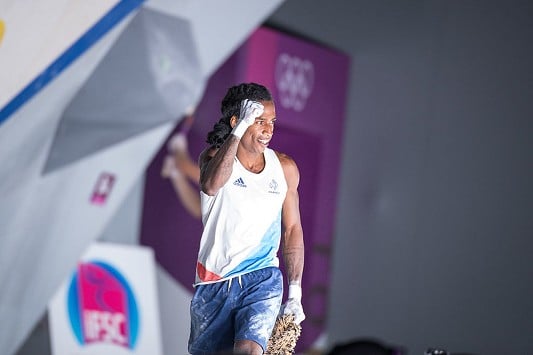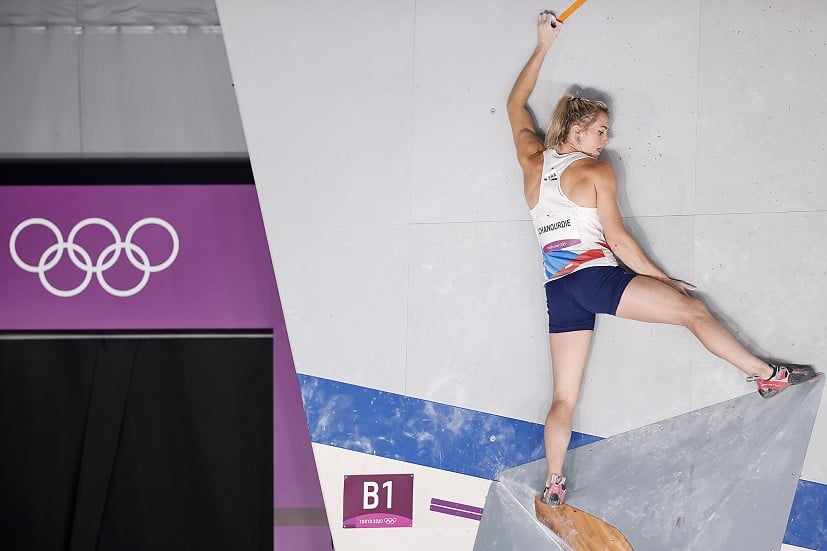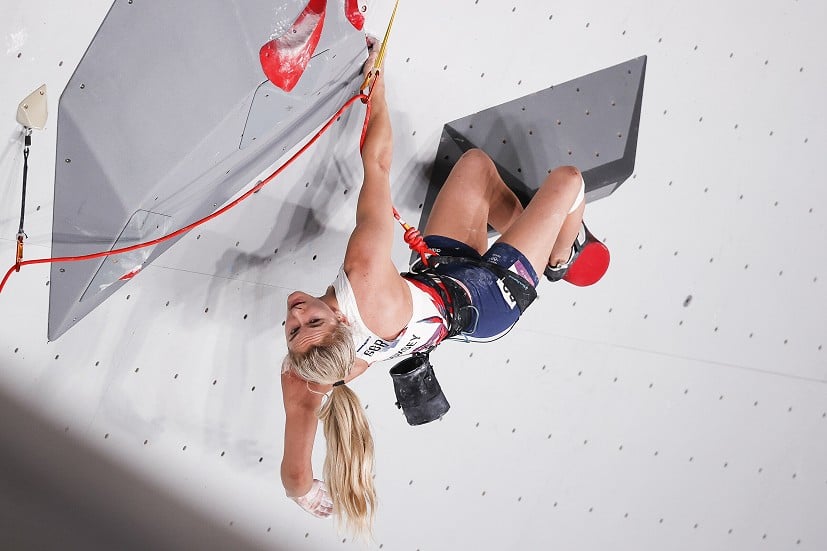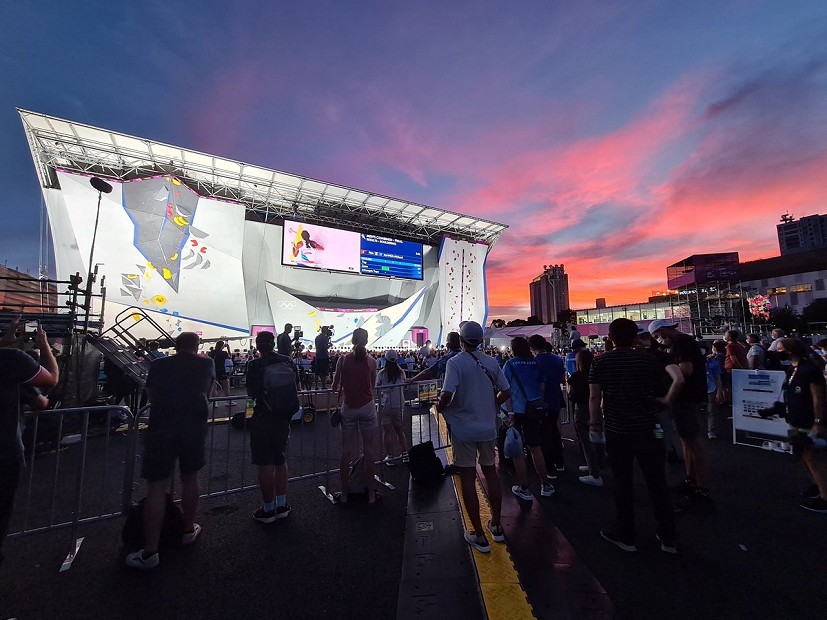As the Sport Climbing selection process for the Paris 2024 Olympic Games is set to begin at the IFSC World Championships in Bern, Switzerland next week, we take a look at the new format, its scoring system and the qualification pathway.
In Tokyo 2020, athletes competed in a three-discipline 'triathlon-like' format combining Speed, Boulder and Lead. Many athletes and fans argued that these disciplines should ideally be split into individual medal events.
Paris 2024 will showcase an improved format, which will double the number of climbing medals and separate Speed from the more similar Boulder & Lead disciplines, while the three-medal individual discipline format will receive its long-awaited debut at Los Angeles 2028.
68 athletes will compete in Sport Climbing's second Olympic showing in Paris, with Speed as a single event and Boulder & Lead as a combined medal.
28 athletes will compete in Speed and 40 in Boulder & Lead, split equally between men and women (14 and 20 per sex).
The events at Paris 2024 will consist of a semi-final and a final round in the Boulder & Lead discipline (top 8 athletes), and a qualification round and a final round (top 8 athletes) in the Speed event.
The new Paris 2024 Boulder & Lead Scoring System - how does it work?
In the new combined Boulder & Lead discipline, the scoring system will be different to the one used in Tokyo 2020. There's still some maths involved (so get your calculators out) but overall it seems to be an improvement on the debut system — once you get your head around it.
Boulder
In Boulder, a major change is that two Zones with points allocated will be marked on the 4 boulders, enabling improved representation of progression and separation. Attempts will also cost the athletes points.
- Twenty-five (25) points will be awarded for a Top, regardless as to whether the competitor has controlled any Zone hold on the boulder;
- Ten (10) points will be awarded where the competitor has controlled the second zone hold but not the top hold, regardless as to whether the first zone hold has been controlled on any attempt; and
- Five (5) points will be awarded where the competitor has controlled the first zone hold only.
- One-tenth of a point (-0.1) will be deducted for each failed attempt on a boulder.
Total points: 100
Examples: a flash of a Boulder would be worth 25 points; a second-go Top would be worth 24.9; reaching the first Zone on a third attempt would be worth 4.8 points.
Note: the -0.1 deduction is only applied for attempts prior to controlling the highest Zone reached or the Top. It does not apply to consecutive unsuccessful attempts, so athletes will not be penalised for making failed attempts to get higher. If they reach the next Zone or Top, the points will be deducted from that higher value.
For example, if a climber reaches Zone 1 in 2 attempts (4.9) and then has multiple failed attempts to get higher without reaching the next Zone or the Top, they are not penalised for further unsuccessful attempts and the score remains the same. If they were to eventually reach Zone 2 in 5 attempts (which would include the first 2 attempts to Zone 1), the score becomes 9.6.
The deduction is only relevant for 'attempts until success' at the highest tier of hold (Zone 1, Zone 2 or Top) reached.

Lead
The Lead routes (one per round) will be split into sections of holds, with each section gradually awarding a greater number of points per hold as the athletes progress up the route.
Only the highest 40 holds of the Lead route will grant points to the athletes.
From the Top to the bottom:
- The highest 10 holds of the Lead route will grant a score of 4 points for securing each hold;
- The 10 holds below will be worth 3 points per hold;
- The previous 10 holds will grant a score of 2 points per hold;
- The 10 holds below will grant a score of 1 point per hold; and
- The remaining holds at the bottom of the Lead route will grant a score of 0 points per hold.
Athletes who fall while moving towards the next hold will be awarded + 0.1 points, the equivalent of the '+' in World Cup scoring.
(Both the Top hold and the final quickdraw must be clipped for 100 points to be awarded, otherwise a failure to clip will result in a score of 99.9, or an early clip without continuing to the Top hold will not be scored as a Top/100 points.)
Total points: 100
The Combined Score
Unlike in Tokyo 2020, where rankings from each discipline were multiplied to determine the final ranking, the Paris 2024 scoring system is a simple addition of the points earned in the Boulder and Lead rounds.
The maximum Combined score is 100 + 100 = 200 points.
To get a clearer idea of how this format plays out in a competition, watch the replays of the 2022 IFSC European Championships in Munich and the IFSC World Cup in Morioka, which trialled this format (only with slightly different Zone points in Boulder and hold-numbering in Lead in Munich):
Munich ECH 2022 - Women's Combined Final
Munich ECH 2022 - Men's Combined Final
And watch the Boulder & Lead event in Bern next week: details on the schedule and how to watch here.

Speed
The Speed format will remain largely similar to the current format in IFSC World Cups, on the same standardised 15m route.
The qualification round will be slightly different, with a seeding heat in which the 14 athletes record their fastest time from two races after one run on each of the two lanes (the same as in World Cups) but with an additional knock-out stage with 7 races. The 7 winners of each race plus the fastest loser based on the quickest time recorded in any qualification run will qualify for the final.
In the final, the eight qualified athletes will follow the same elimination or 'knock-out' process as in World Cup finals, starting with a quarterfinal and a semi-final, before the 'small' final and 'big' final determine the medallists.
More information on the Speed discipline.
The Qualification Pathway for Paris 2024
So that's the format...but who will be vying for the medals?
Qualification will begin at the 2023 IFSC Climbing World Championships in Bern, Switzerland, from 1-12 August 2023. The top 3 athletes per sex in Boulder & Lead and the top 2 per sex in Speed will be eligible for a quota place. (10 places)
Athletes who fail to make the top 3 in Bern can compete for a spot by winning their respective IFSC continental championship qualifying event (or being the next-highest placed eligible athlete) to be held between September and December 2023. (4 places per continent [2 x Boulder & Lead, 2 x Speed, 1 per sex] = 20 places)
The final opportunity to earn a ticket will be during two invitational Olympic Qualifier Series events in Shanghai and Budapest from May to June 2024. 80 athletes will be eligible to compete in these events: 48 Boulder & Lead athletes and 32 in Speed, based on 2023 World Rankings and the opportunity to earn double-weighted ranking points from the Bern World Championships. The top 10 men and women in Boulder & Lead and the top 5 in Speed at the end of the series will earn quota places. The locations of these events are yet to be confirmed. (20 Boulder & Lead, 10 Speed = 30 places)
Plus: 4 Host Country spots (France is guaranteed one male and one female spot per discipline, which may be reallocated if any French athletes qualify directly) and Universality quota places (to ensure representation from underrepresented countries, which may be reallocated if no eligible nations compete and meet ranking criteria [watch a video explainer]) for Boulder & Lead, and 4 for Speed, totalling 8 places.
The total number of athletes will be 68.
Qualification will be limited to two Sport Climbing athletes per nation per gender in each discipline (Speed, and Boulder & Lead combined).
Qualifying places will be allocated to the athletes by name, meaning they are not transferrable to other athletes in their national team.
Read the official Sport Climbing qualification documents on Olympics.com
Reas the official IFSC Rules.
The Games of the XXXIII Olympiad are scheduled to take place in the French capital from 26 July to 11 August 2024.
More information about Sport Climbing at Paris 2024 is available on the IFSC website.
Full schedule and how to watch the IFSC Bern World Championships here.
- SKILLS: Top Tips for Learning to Sport Climb Outdoors 22 Apr
- INTERVIEW: Albert Ok - The Speed Climbing Coach with a Global Athlete Team 17 Apr
- SKILLS: Top 10 Tips for Making the Move from Indoor to Outdoor Bouldering 24 Jan
- ARTICLE: International Mountain Day 2023 - Mountains & Climate Science at COP28 11 Dec, 2023
- ARTICLE: Did Downclimbing Apes help Evolve our Ultra-Mobile Human Arms? 5 Dec, 2023
- ARTICLE: Dàna - Scotland's Wild Places: Scottish Climbing on the BBC 10 Nov, 2023
- INTERVIEW: Loki's Mischief: Leo Houlding on his Return to Mount Asgard 23 Oct, 2023
- INTERVIEW: BMC CEO Paul Davies on GB Climbing 24 Aug, 2023
- INTERVIEW: Malcolm Bass on Life after Stroke 8 Jun, 2023
- ARTICLE: Alexandr Zakolodniy - A Climbing Hero of Ukraine 26 Apr, 2023

















Comments
Very informative. Thanks.
In lead, I’m assuming clipping the chain has no value as such, is that correct? Cue celebratory whippers off the last hold…
Also, no “plus” mark in lead. Perhaps seen as too subtle for the wider Olympic audience but I’d have thought there would be some merit in giving 0.1 points in lieu of a plus…
Just updated to explain those situations. There is actually a +0.1 for moving positively from a hold before falling (and it happened in the two trial format competitions) but I couldn't find it in the rules until just now! I thought it had been dropped somehow.
Super! Alles ist klar.
It's a bit confusing because there are separate events for bouldering, lead and combined at the Bern world champs but only the combined bit is part of the Olympic qualification.
Yeah, the individual events qualify the climbers to the combined event. Basically the rankings from the spearate Boulder and Lead championships will be assigned a certain number of points and then they are added to form a total. Top 20 make the combined event. From the IFSC guide to the format in Bern:
After the conclusion of the single disciplines, the Boulder & Lead semi-finals and finals will be held (20 athletes per gender). In order to qualify the athletes to the Boulder & Lead semi-finals, article 13.5.D.2 of IFSC rules will apply. 2) where no combined Boulder & Lead competition in the Combined Discipline is held, a combined Boulder & Lead ranking will be calculated from the General Rankings for the competitions in the Boulder and Lead disciplines, assigning ranking points as set out at Annex 3 (Cup Ranking Points) to each set of results. A points total will be calculated for each competitor participating in both Boulder and Lead disciplines and these competitors will be ranked in descending order of the total points awarded and the ranking published. Following this article, a Boulder & Lead ranking will be generated at the end of the European Championships three disciplines. From this ranking, the best 20 athletes will be selected to compete at the B&L semi-finals.
https://cdn.ifsc-climbing.org/images/Events/2023/230801_Bern_WCH/BL_guide_Bern_WCH.pdf